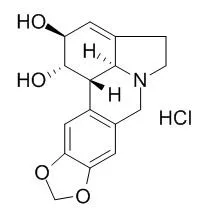Uncontrolled tumor cell proliferation and robust neovascularization are prominent features of aggressive ovarian cancers. Although great efforts in anti-ovarian cancer therapy have been made in the past 4 decades, the 5-year survival rates for ovarian cancer patients are still poor, and effective drugs to cure ovarian cancer patients are absent.
METHODS AND RESULTS:
In this study, we evaluated the anti-cancer effects of lycorine hydrochloride (Lycorine chloride,LH), a novel anti-ovarian cancer agent, using the highly-invasive ovarian cancer cell line, Hey1B, as a model. Our data showed that LH effectively inhibited mitotic proliferation of Hey1B cells (half maximal inhibitory concentration=1.2μM) with very low toxicity, resulting in cell cycle arrest at the G2/M transition through enhanced expression of the cell cycle inhibitor p21 and marked down-regulation of cyclin D3 expression. Moreover, LH suppressed both the formation of capillary-like tubes by Hey1B cells cultured in vitro and the ovarian cancer cell-dominant neovascularization in vivo when administered to Hey1B-xenotransplanted mice. LH also suppressed the expression of several key angiogenic genes, including VE-cadherin, vascular endothelial growth factor, and Sema4D, and reduced Akt phosphorylation in Hey1B cells.
CONCLUSIONS:
These results suggest that LH selectively inhibits ovarian cancer cell proliferation and neovascularization and is a potential drug candidate for anti-ovarian cancer therapy. |






 Cell. 2018 Jan 11;172(1-2):249-261.e12. doi: 10.1016/j.cell.2017.12.019.IF=36.216(2019)
Cell. 2018 Jan 11;172(1-2):249-261.e12. doi: 10.1016/j.cell.2017.12.019.IF=36.216(2019) Cell Metab. 2020 Mar 3;31(3):534-548.e5. doi: 10.1016/j.cmet.2020.01.002.IF=22.415(2019)
Cell Metab. 2020 Mar 3;31(3):534-548.e5. doi: 10.1016/j.cmet.2020.01.002.IF=22.415(2019) Mol Cell. 2017 Nov 16;68(4):673-685.e6. doi: 10.1016/j.molcel.2017.10.022.IF=14.548(2019)
Mol Cell. 2017 Nov 16;68(4):673-685.e6. doi: 10.1016/j.molcel.2017.10.022.IF=14.548(2019)